All About Brand Marketing and How to Do It Before It’s Too
Late.

Curious about brand marketing and how to leverage its power
for your small business? We cover everything you need to
know to craft a winning branding strategy in 2024.
You're scrolling through your phone, trying to find the
perfect gift for your friend's birthday. As you browse
the endless options, one company's products keep
catching your eye. The visuals are on-point, the messaging
speaks directly to your needs, and there's just
something about the brand that feels...trustworthy. You end
up placing an order, confident that you're getting
quality and care, not just another generic item.
That is the magic of brand marketing - and it's not just for the big corporate giants. In fact, small businesses have a huge opportunity to harness the power of branding to outmaneuver your larger competitors.
So, what is brand marketing, and how can you use it to your advantage? Let’s break it down.
That is the magic of brand marketing - and it's not just for the big corporate giants. In fact, small businesses have a huge opportunity to harness the power of branding to outmaneuver your larger competitors.
So, what is brand marketing, and how can you use it to your advantage? Let’s break it down.
What is Brand Marketing, and Why Does It Matter?

Today’s consumers are inundated with endless options, and
they're increasingly seeking out businesses that align
with their values and offer a unique, memorable
experience.
Brand marketing is all about crafting a unique identity for your business - one that resonates with your target customers on an emotional level. It's not just about slapping a logo on your products or pumping out generic social media posts. It's about defining your core values, telling compelling stories, and consistently projecting an image that sets you apart.
Think of it this way: your brand is the personality of your business. It's how you want your customers to perceive you, feel about you, and connect with you. And when you get it right, that connection can be the secret weapon that helps you win over customers, even in the face of big-name competition.
By investing in a well-crafted brand strategy, you can differentiate your small business, build trust and loyalty with your target audience, and ultimately drive long-term growth and success.
Brand marketing is all about crafting a unique identity for your business - one that resonates with your target customers on an emotional level. It's not just about slapping a logo on your products or pumping out generic social media posts. It's about defining your core values, telling compelling stories, and consistently projecting an image that sets you apart.
Think of it this way: your brand is the personality of your business. It's how you want your customers to perceive you, feel about you, and connect with you. And when you get it right, that connection can be the secret weapon that helps you win over customers, even in the face of big-name competition.
By investing in a well-crafted brand strategy, you can differentiate your small business, build trust and loyalty with your target audience, and ultimately drive long-term growth and success.
Effective Brand Marketing Has Undeniable Advantages

In the past, small businesses may have felt at a
disadvantage when it came to competing with larger
corporations and their deep pockets. However, the AI
revolution has leveled the playing field, and small
businesses now have access to powerful brand-building tools
and AI-powered strategies.
Here are some of the key advantages of effective brand marketing for small and medium-sized enterprises:
Here are some of the key advantages of effective brand marketing for small and medium-sized enterprises:
1. Increased Brand Visibility and Recognition
Through a cohesive branding strategy that spans your
website, social media, advertising, and other touchpoints,
you can elevate your business's visibility and make a
lasting impression on your target audience. This heightened
brand awareness can translate into increased customer
acquisition and retention.
2. Stronger Emotional Connections with Customers
By crafting a unique brand personality and storytelling
approach, you can forge deeper, more meaningful connections
with your customers.
When people feel an emotional attachment to your brand,
they're more likely to become loyal advocates and
refer others to your business.
3. Higher Perceived Value and Pricing Power
A well-established, reputable brand can command a premium in
the market, allowing you to charge higher prices for your
products or services. Customers are often willing to pay
more for a brand they trust and associate with quality.
4. Improved Employee Recruitment and Retention
Think having a strong brand identity is only to attract
customers? Well, a strong, positive brand image can also
work in your favor when it comes to attracting and retaining
top talent. Employees are more likely to feel proud and
motivated to work for a company with a clear, compelling
brand identity.
Crafting a Winning Brand Strategy for 2024 and Beyond
As you look to capitalize on the power of brand marketing in
2024, it's essential to develop a comprehensive
strategy that aligns with your business goals and resonates
with your target audience.
1. Define Your Brand's Unique Personality and Values
Start by taking a deep dive into your business, your
products or services, and your core customers. What makes
your company special? What values and qualities do you want
to convey? Distill these insights into a clear brand
personality and value proposition.
2. Create a Consistent Visual Identity
Your brand's visual elements, from your logo and color
palette to your website design and packaging, should work in
harmony to bring your brand personality to life. Consistency
across all touchpoints is key to building recognition and
trust.
3. Give Your Brand a Story
Storytelling is a powerful tool in the world of brand
marketing. Share the behind-the-scenes glimpses, the
customer success stories, and the "why" behind
your business. This helps customers connect with your brand
on a deeper, more emotional level.
4. Leverage the Power of Digital Channels and Engage With
Your Audience
In 2024, your brand's digital presence will be more
important than ever. Invest in a user-friendly website,
leverage social media platforms to engage with your
audience, and explore emerging technologies like augmented
reality or interactive video to create immersive brand
experiences.
5. Foster a Culture of Brand Ambassadors
Ensure that your employees are not just aware of your brand,
but that they're also champions of it. Empower them to
be brand ambassadors, advocating for your company's
values and delivering exceptional customer experiences.
6. Focus on Quality and Consistency
Every touchpoint with your brand should reflect the same
high standards and attention to detail. This builds trust
and loyalty over time.
The Rise of the Purpose-Driven Brand
Another key trend that small businesses should keep in mind
is the growing importance of purpose-driven branding.
Consumers, especially younger generations, are increasingly
drawn to brands that align with their personal values and
contribute positively to society.
You can capitalize on this potent customer reaction and establish an even closer emotional bond with your target market by giving your brand a distinct purpose and a dedication to social responsibility. This could entail promoting sustainable practices, helping out neighborhood charities, or speaking up in favor of significant social causes.
Keep in mind that brand marketing is about developing an experience that connects with your target audience more deeply than simply pushing goods or services. Small firms that can leverage purpose-driven branding to set themselves apart, gain credibility, and develop enduring relationships with their target audience will be the ones that thrive in 2024 and beyond.
You can capitalize on this potent customer reaction and establish an even closer emotional bond with your target market by giving your brand a distinct purpose and a dedication to social responsibility. This could entail promoting sustainable practices, helping out neighborhood charities, or speaking up in favor of significant social causes.
Keep in mind that brand marketing is about developing an experience that connects with your target audience more deeply than simply pushing goods or services. Small firms that can leverage purpose-driven branding to set themselves apart, gain credibility, and develop enduring relationships with their target audience will be the ones that thrive in 2024 and beyond.
Frequently Asked Questions
What is Brand Marketing?
Brand marketing is all about telling your story - who you
are, what you offer, and why people should care. It's
the process of developing your brand's personality and
image so you stand out from the competition in a meaningful
way. While ads and promotions are part of it, branding is
the backbone. It gives customers insight into what your
business is really about and why they should choose you.
So how do you actually do brand marketing in the real
world?
The first step is figuring out your special sauce - what
makes you different? Take time to understand your
products/services inside and out. Then listen to your
customers to know what really matters to them. With that
insight, define your "unique selling proposition"
or USP for short. That's the one-sentence statement
that sums up why people should pick you. Once you nail that
down, start crafting messaging to tell people about the
value you deliver.
Is brand marketing even effective nowadays with so much
digital noise?
More than ever! In this chaotic online landscape, it's
critical for brands to stake their claim. By building an
identity that sets you apart, branding helps cut through the
clutter. As long as you stay true to who you are and what
you represent, brand marketing will absolutely work for your
business today. In fact, it might just be the difference
between rising above the rest or getting lost in the
shuffle.
Final Words
The bottom line is this: brand marketing isn't just for
the big players. In fact, it might be your secret weapon for
standing out in a crowded market and forging those
meaningful connections with your customers. So embrace your
unique story, get creative, and watch your business soar.

